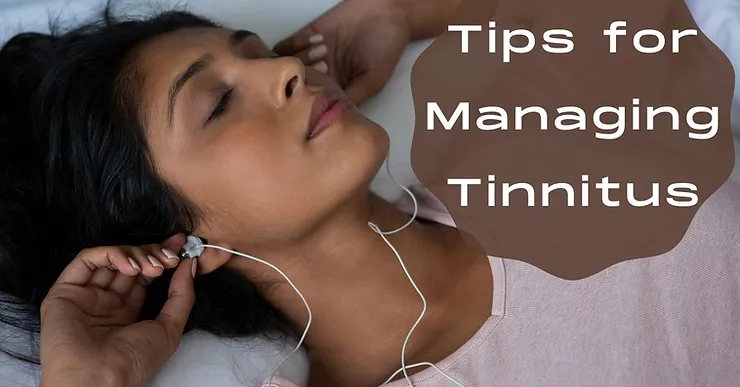
Most people describe tinnitus as a constant ringing sound in one or both ears. But it can also sound like clicking, buzzing, humming etc. Tinnitus is a symptom, rather than a condition itself, that up to 20% of people experience. Ranging in severity, tinnitus can be a symptom of various underlying conditions including: hearing loss, ear injury, and blood vessel issues. It is important to see a doctor if your tinnitus is chronic. Your doctor will examine your ears and conduct tests to identify any medical conditions that could be causing the tinnitus. Additionally, there are useful tips you can practice to manage your tinnitus.
Common Causes of Tinnitus
Tinnitus is the sensation of hearing sound when there is no actual sound in the external environment you are in. It is bothersome and can make your ability to concentrate difficult. Tinnitus can be caused by a variety of factors including the following:
-
Hearing loss: is the third most common chronic health condition that older adults experience. Tinnitus is a common symptom of this medical condition which can be caused by other health issues (cardiovascular disease, hypertension, diabetes, obesity etc.), genetic history, and environmental exposure to loud noise.
-
Exposure to loud noise: we are constantly absorbing noise throughout the day. Noise above 85 decibels can be potentially harmful to our hearing. Loud noise can cause the hair cells in the inner ear to lose sensitivity and become ineffective. This can lead to tinnitus and permanent hearing loss.
-
Earwax Buildup: the accumulation of earwax in the ear can cultivate more bacteria, causing an infection or irritation of the eardrum which can trigger tinnitus.
Other causes of tinnitus include: changes to the bones in the ear, muscle spasms in the inner ear, and blood vessel disorders.
In addition to having a difficult time focusing, tinnitus can disrupt sleep which causes exhaustion and fatigue. People may also experience heightened stress, issues with memory, and irritability. Regularly experiencing tinnitus can contribute to depression and anxiety. If left untreated and unmanaged, tinnitus can impact quality of life and general well-being.
Best Ways to Manage Tinnitus
There are useful ways that you can manage your tinnitus so that it has less of a presence in your daily life. A few helpful tips include:
-
Find ways to relax: alleviating stress and finding ways to relax can help alleviate tinnitus. There are various things you can try such as yoga, meditation, and different exercises that relax your muscles and mind.
-
Create ambient noise: while in quieter settings, tinnitus may be heightened. You are more likely to focus on the tinnitus which makes it more bothersome. Using ambient noise can be a helpful way to distract and mask the sound. You can put on soft music, use a white-noise machine, turn the TV on etc.
-
Engage in physical activity: being active by exercising, going on walks, hiking etc. can decrease tinnitus intensity by decreasing stress, improving mood, and enhance sleep.
-
Get quality sleep: lack of sleep can worsen tinnitus which also makes sleeping more difficult. You can try establishing a routine before going to sleep that helps you relax: taking a bath, using essential oils, not using electronic devices etc.
-
Reduce consumption of caffeine: substances such as caffeine, alcohol, and nicotine can worsen tinnitus. It is important to observe the effect it might have on you and monitor if it activates your tinnitus.
-
Protect your ears: from absorbing noise. You can do this by wearing protective gear such as earmuffs, earplugs, and headphones. Wearing protection serves as a barrier between your ears and loud noise. This can reduce your risk of hearing loss and experiencing tinnitus.
-
Have your hearing tested: scheduling an appointment to have your hearing assessed is this is the best way to identify if you are experiencing hearing loss. Hearing tests are a useful way to determine if you have any impairment, the degree, and specific type of hearing loss. This will inform the best treatment to meet your specific hearing needs.
Tinnitus can significantly impact your ability to navigate on a daily basis. By taking a few proactive measures and practicing useful tips, you can manage your tinnitus effectively and protect your hearing health! Contact us today to learn more about tinnitus treatment options.
